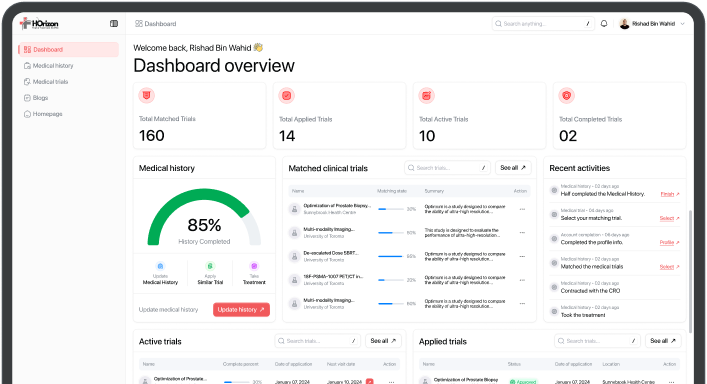Imagine being told there’s a chance for something better—a new therapy or approach that might change everything. For men facing prostate cancer in Canada, clinical trials offer this glimmer of hope. These trials are more than scientific experiments; they’re lifelines and opportunities to redefine treatment possibilities. But how do they work? And how can you find one that’s right for you or your loved one? Let’s dive in.
Why Clinical Trials Are Crucial
Clinical trials are the backbone of medical progress. They test innovative approaches to treatment, refine existing methods, and explore new ways to improve patient outcomes. For prostate cancer, these trials often focus on:
- Access to New Treatments
Patients gain early access to therapies not yet widely available, including experimental drugs and cutting-edge procedures. - Personalized Medicine
Many trials emphasize precision medicine, tailoring treatments to individual genetic profiles and tumor characteristics for better results. - Scientific Contributions
Participation helps researchers gather valuable data to refine treatments, paving the way for future advances in prostate cancer care.
Why Prostate Cancer Trials Are a Big Deal in Canada
Canada has carved a significant niche in the global clinical research space, particularly for prostate cancer. Here’s why:
- A Thriving Research Ecosystem Canada is home to some of the world’s top research institutions and teaching hospitals. Places like the BC Cancer Agency and Princess Margaret Cancer Centre don’t just treat cancer—they’re actively shaping the future of how it’s managed.
- Focus on Individualized Care A lot of the ongoing trials revolve around personalized medicine, meaning treatments are tailored to the individual. For prostate cancer, this often involves studying genetic markers or testing therapies that target specific cancer growth drivers.
- Access to Emerging Technologies Canadian researchers are at the forefront of testing breakthrough tools like high-intensity focused ultrasound (HIFU) and advanced imaging techniques. These innovations make prostate cancer treatments more precise, reducing side effects and improving outcomes.
What Makes Clinical Trials Unique?
You might wonder: “Why choose a clinical trial over standard treatment?” The answer isn’t straightforward because it depends on the patient’s situation. Clinical trials offer access to cutting-edge therapies that aren’t yet available to the general public. For some, it might mean a better quality of life. For others, it’s a chance to contribute to research that could save lives down the road.
However, they come with risks—experimental therapies don’t guarantee success, and there’s always the possibility of side effects. The key is to weigh these factors and have an open conversation with your healthcare team.
What Kinds of Trials Are Out There?
Prostate cancer trials in Canada generally fall into a few categories:
- Immunotherapy Studies: These trials investigate treatments that train the immune system to recognize and attack cancer cells.
- Precision Oncology Trials: Some studies focus on drugs that target genetic mutations unique to prostate cancer.
- Radiotherapy Innovations: There are trials exploring how to make radiation more effective while minimizing harm to surrounding healthy tissues.
- Lifestyle and Support Research: Believe it or not, some trials examine the impact of exercise, diet, and mental health support on prostate cancer outcomes.
Each trial addresses a specific question. Whether it’s testing a new medication or evaluating how a treatment works in combination with others, every study is a step forward.
Finding a Trial: Where to Start?
If you’re ready to explore clinical trials, there are plenty of resources to help. For instance:
- National Databases: Websites like ClinicalTrials.gov and Canadian Cancer Trials Group provide detailed listings.
- Cancer Centers: Many hospitals have clinical trial coordinators who can guide you through the process.
- Technology-Driven Platforms: New tools, like AI-powered trial matching platform Horizon Trial, simplify the search by connecting patients to trials suited to their medical profiles.
It’s also worth asking your doctor for recommendations. They can help interpret the technical jargon and determine whether a trial aligns with your current treatment plan.
Key Considerations Before Enrolling
Before joining a trial, it’s important to understand the details:
- Informed Consent Process: Participants receive detailed explanations about the trial, ensuring transparency about procedures, expectations, and monitoring.
- Eligibility Criteria: Trials have specific requirements based on factors like age, health, and cancer stage.
- Potential Risks and Benefits: Weighing the possible advantages of cutting-edge therapies against potential side effects or uncertainties is essential.
A Final Thought
Prostate cancer clinical trials are a testament to the power of science and human determination. They’re not just about statistics or data points; they’re about stories, resilience, and the pursuit of something better.
If you or a loved one is navigating this journey, consider clinical trials as more than an option. Think of them as a bridge to hope—a way to take an active role in your care while contributing to a legacy of progress.

